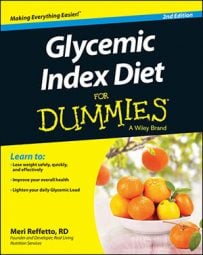Selecting low-glycemic foods rather than high-glycemic ones is always a good tactic for weight loss. And many low-glycemic foods also provide great health benefits because many are packed with fiber, vitamins, minerals, antioxidants, and healthy monounsaturated fat. Eating a wide variety of healthy low-glycemic foods means you get the unique benefits that each food can provide. While it's easy to get stuck in a rut with food choices, the following list of ten fabulous foods may inspire you to try new foods or bring back some old favorites.
Lowfat yogurt
Yogurt is a fermented dairy product made by adding bacteria cultures to milk, resulting in a thicker texture and a tart, tangy taste. A wide range of bacteria is used to make yogurt, and each different bacteria strain has specific potentially healthy benefits. The good news is that all the types of live bacteria found in yogurt help promote overall health. Unfortunately, not all yogurt sold contains live active cultures. For the purpose of shelf-stability, many yogurts are heat treated — a process that kills off the healthy bacteria. So as you're choosing yogurt, select containers that say live active cultures somewhere on the label.
Yogurt is a good source of calcium, riboflavin, protein, vitamin B12, potassium, and zinc. Many types of yogurt now also contain added vitamin D, which many people are deficient in vitamin D, which can lead to numerous health problems such as high blood pressure and some types of cancer. Eating yogurt with added vitamin D can help prevent you from developing a vitamin D deficiency.
Almonds
Fun fact for the day: Almonds are actually the seed of a flowering tree! Almonds are a good source of manganese, vitamin E, magnesium, vitamin B2, copper, and phosphorous. Almonds are also high in healthy monounsaturated fats and have been linked to a lower risk of heart disease in numerous studies. Almonds are also a good source of vegetarian protein.
Just watch out for calories! While almonds are very healthful, they can add up in calories quickly. As with all foods, watch your serving size and enjoy an ounce a day!
Artichokes
The artichoke is a much loved vegetable that's a star of the Mediterranean diet, a traditional, heart-healthy way of eating derived from regions of Southern Italy and Crete. Artichokes contain a high amount of antioxidants that provide an overall boost to your health. They're also a good source of vitamin C. And don't forget that one medium artichoke has more fiber than 1 cup of prunes!
Asparagus
It's amazing how much nutrition is packed into each tender spear of asparagus. With only four calories per spear, asparagus is a favorite vegetable for anyone conscious of their calorie intake. Asparagus is also a good source of potassium, fiber, folate, thiamin, and vitamin B6, plus antioxidants (such as glutathione) that help protect against cell damage that may lead to cancer.
Asparagus is sensitive to oxidation so make sure to eat it quickly after purchasing, and store it with a wet cloth covering the bottom stems to help preserve the healthy nutrients.
Broccoli
Broccoli routinely makes the list of super-vegetables that contain extremely high amounts of nutrients. It's a cruciferous vegetable that contains anti-cancer compounds and phytochemicals that may help protect against heart disease. One cup of steamed broccoli contains more than 200 percent of your daily intake of vitamin C; it's also a good source of vitamin K, vitamin A, folate, and potassium.
Blueberries
Blueberries are not only a popular fruit, but they are also ranked high in antioxidant activity helping to protect you from cell damage. Blueberries are a good source of vitamin K, manganese, and vitamin C while providing 14 percent of your daily fiber needs.
Freezing blueberries doesn't harm the antioxidant activity so storing frozen blueberries to use in your smoothies or on your cereal is a great way to go.
Lettuce
Don't underestimate the nutrients you can get from a simple salad! Hundreds of different types of lettuce are available today, and all of them are very low in calories and low-glycemic. They also contain a high water content, which helps fill you up so you feel satisfied longer and helps to keep you hydrated. Lettuce with darker-green leaves contains higher amounts of vitamins and minerals compared to the lighter-colored types of lettuce. For example, romaine lettuce is an excellent source of vitamin K, vitamin A, vitamin C, folate, and manganese. Yet don't pass up lighter green lettuces such as iceberg or butterhead; they also contain antioxidants and healthy amounts of several vitamins.
Peppers
All colors of peppers are good sources of vitamins A and C. Red bell peppers (which are actually fully ripened green peppers with a milder flavor) contain lycopene, a phytochemical that may help reduce the risk of some types of cancer. Choose a variety of colors of peppers for their taste, visual appeal, and nutrition content.
Spinach
Popeye was right — spinach is a good vegetable source of iron. You'll find more nutrients than just iron, though. Spinach contains a significant amount of nutrients, too many to list here! To give you an idea it also contains antioxidants that help protect against cancer, as well as vitamins A, C, K, E, and several B vitamins. You'll also find an assortment of minerals and even some omega-3 fatty acids not to mention 24 percent of your daily calcium needs. Toss raw baby spinach into salads, or add to your favorite rice at the last minute of cooking for a splash of color and flavor.
Tomatoes
For a vegetable believed at one point to be poisonous, tomatoes have come a long way nutritionally. They're a rich source of lycopene, especially when cooked. Lycopene is associated with the prevention of cancer, heart disease, diabetes, macular degeneration, and the aging of skin. Not too bad, plus you get to enjoy the flavor of your favorite cooked tomato product like marinara sauce.

